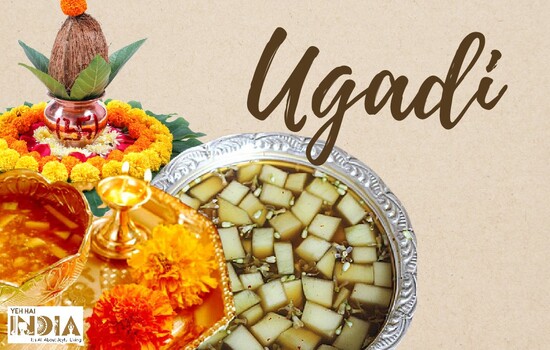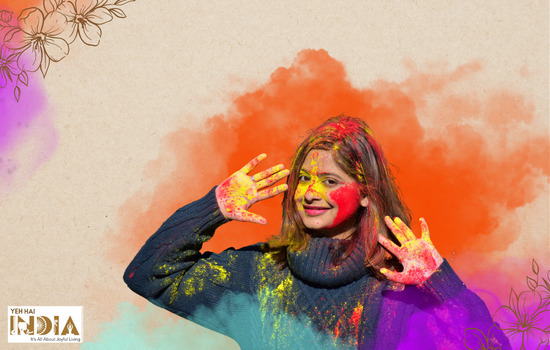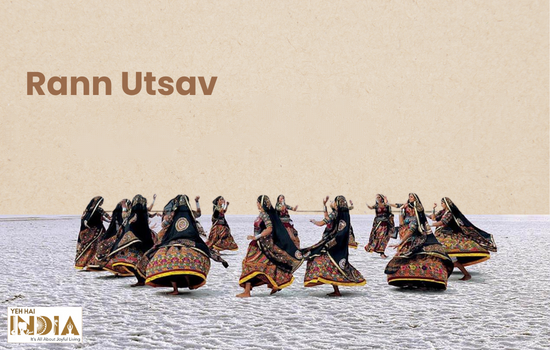Ugadi, also known as Samvatsaradi is the celebration of the first day of the Chaitra month of the Hindu calendar.
Typically falling in the month of April, Ugadi is a festival celebrated with great fervour to welcome the arrival of spring season.
Every year, people from the States of Andhra Pradesh, Telengana and Karnataka decorate their homes, cook mouth-watering traditional food items, and conduct special prayers on this auspicious day to celebrate the beginning of a new year.
Ugadi 2022 fell on the 2nd of April this year.
‘Ugadi’: Significance and Traditional Beliefs
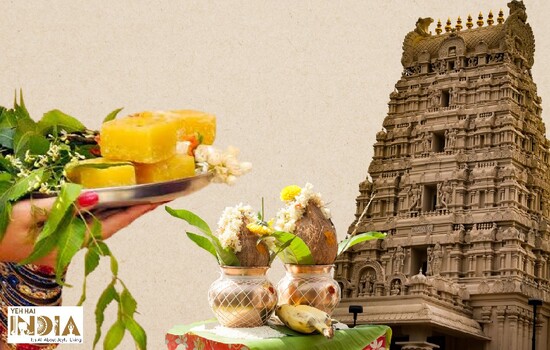
The word ‘Ugadi’ comes from the Sanskrit words “yuga” meaning time and “adi” meaning origin or beginning. It literally means the beginning of a new age.
An important Hindu festival in the Southern India, its name is believed to have arisen from the legend according to which Brahma, the lord of knowledge and creation began creating the world on this day.
Another traditional belief is to seek blessings from Lord Vishnu who also goes by the name of Yugaadi-krit which means ‘the creator of Yugas.’
The Hindu lunar calendar followed by the people of these 3 states of South India not only marks New Year with Ugadi, but also the beginning of Chaitra Navaratri. At the end of the 9 days of this Navaratri is the celebration of Lord Rama’s birth, Ram Navami.
Recommended Story – VISHU – Kerala New Year
Ugadi Traditions and Rituals
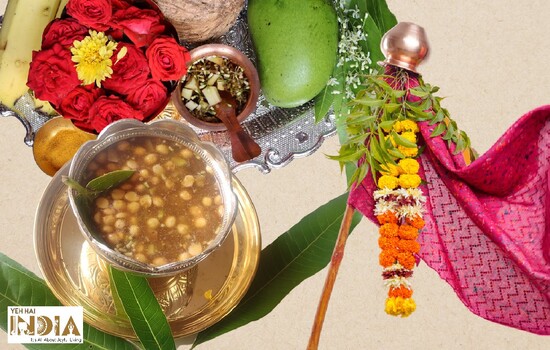
Ugadi festival is also the celebration of the turn in seasons with the arrival of summer and beginning of spring. The festivities begin at homes at least a week before with the preparations that include cleaning and decorating the houses with mango leaves and flowers.
The leaves are fashioned into a garland and hung at the head of the doors and at the entrance of the household. These mango leaf garlands are called torana.
The day before, people sprinkle cow dung mixed with water all around their homes and decorate their front entrances with rangoli or muggulu. Rangoli are designs drawn on the floors with colours or rice flour.
Early in the morning, on Ugadi, everyone starts their day with a full body/ head oil massage and a hot bath which is followed by prayers and a sumptuous feast.
Famous Ugadi Dishes
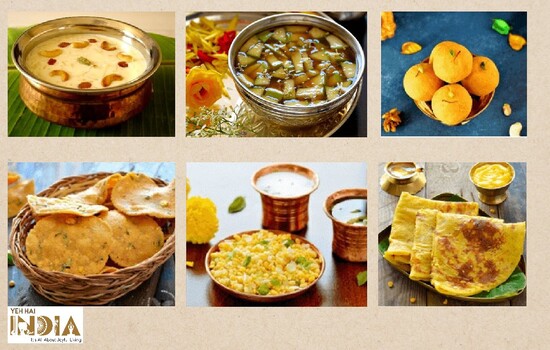
On the occasion of Ugadi, there are a number of dishes prepared at home, specifically for lunch. These dishes are special traditional recipes that are specific for the region Ugadi is celebrated in.
The Ugadi pachadi made during Ugadi is specifically prepared with 6 main ingredients to include all 6 tastes – sweet, spicy, salty, sour, pungent and bitter. The dish is believed to represent the encompassing of all 6 human emotions – happiness, sadness, anger, fear, disgust and surprise.
The 6 ingredients that go in this dish are neem flowers, raw mango, jaggery, pepper powder, salt and tamarind. The preparation of this dish varies from state to state and from house hold to house hold.
You can alter the quantity of the ingredients used to suit it to your taste buds. Traditionally, this pachadi is made to taste slightly bitter, sweet and spicy at the same time.
Apart from the pachadi, the most commonly prepared dishes include sweets, snacks and meal items such as sweet pongal, kesari, vada, payasam, chitranna (flavoured rice varieties), poornam borelu, obbattu (or pooran poli), appam, etc. along with the full-meal items of sambar, rasam, curd, vegetables in the form of poriyal and kootu, and white rice.
To ensure optimum health of your loved ones, gift them something healthy like this Iron Rich Organic Ragi Laddus!
Ugadi and Gudhi Padwa
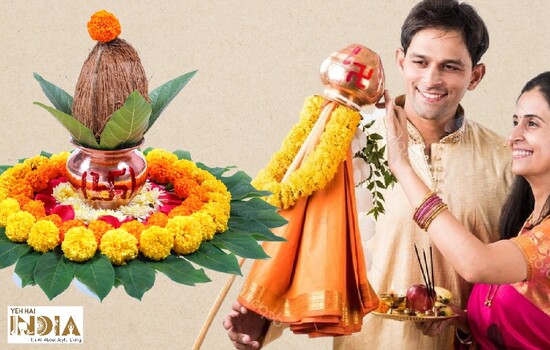
The same day, Ugadi is celebrated in the southern tri-states, the Marathi and the Konkani Hindus in the northern part of India celebrate Gudhi Padwa as the festival of the spring and also to mark the beginning of a new year.
Gudhi Padwa is observed with a cloth decorated with mango leaves, neem leaves and flower garlands, gathi (garland of sugar crystals) and copper or silver vessels placed upturned on top of it.
This arrangement is called as the Gudhi dvaja along with which people dance, sing and conduct processions in the streets for celebration of the auspicious day.
The Diversity
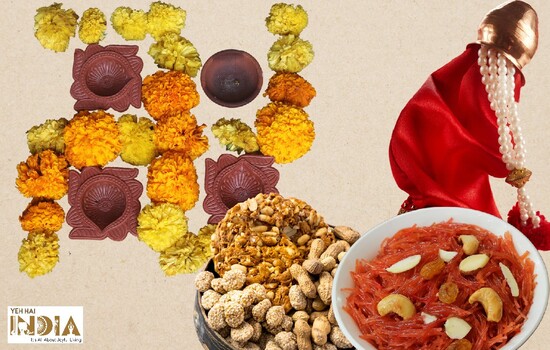
The Gudhi Padwa or Ugadi is generally celebrated by Hindus but not altogether by all of them. Even in the South, celebration of Ugadi is limited to the states of Andhra Pradesh, Telengana and Karnataka, while the remaining 2 states – Tamil Nadu and Kerala celebrate their New Year on a different day.
More than that, the way people celebrate this new beginning is poles apart. While the southerners keep the celebration to their households and temples, the northerners make a full blown festival out of this with merry dances and processions.
It is a wonderful way to begin a new year however diverse may be the commemorations carried out.
Check out this 100% Organic And Healthy Payasam Mix!
Summary:
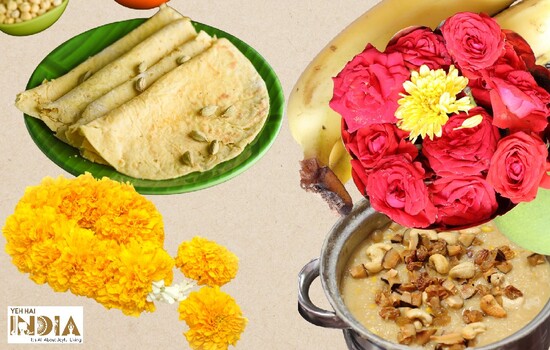
Ugadi or Yugadi or Samvatsaradi is the first day of the New Year based on the lunar calendar followed by the Hindus of India. Ugadi falls in the first or second week of April usually depending on the cycle of the moon.
People from the states of Andhra Pradesh, Telengana and Karnataka celebrate this day to celebrate the arrival of spring with prayers, decorations and tasteful dishes.
People start their New Year with hot oil baths, rangolis, neem or mango leaves and flower garlands decorating their door steps and deliciously prepared meals.
The classic 6-ingredient pachadi is one such dish that is prepared in every home on Ugadi. Ugadi is also celebrated as Gudhi Padwa in the north by the Marathi and Konkani Hindus on the same day.
Be a part of the festivities and frolic showcased in this spring festival to get an insight into the beautifully rich culture of India.
Also Read – The Hindu New Year


